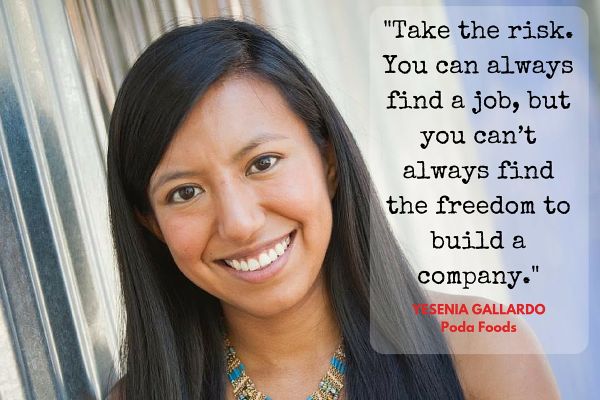
Food & Beverage NewsRising Star: Yesenia Gallardo of Poda Foods Aims to Make Cricket Powder the Next Big Thing
For many, the sound of chirping crickets brings back memories of warm summer nights. But Yesenia Gallardo hears something different in those chirps—an untapped protein source.
As Americans are beginning to warm up to the idea of edible insects, food entrepreneurs are scrambling to find a reliable supply. That piece of the puzzle has proven to be elusive, but Poda Foods has a solution. Learn more from Yesenia:

What was the spark that inspired the birth of your concept?
My mother—she is generally the motivator/spark for most of my ideas. She introduced me to chapulines, a delicious edible grasshopper commonly eaten in southern Mexico. She grew up eating them, and so did I in our many visits to see grandparents, aunts, and cousins in Mexico. While I was there a few years ago, I thought it might be an interesting concept to try in the United States. When I came back to Yale, I put together a team to work on the idea, and Poda Foods was born.
What problem does it solve?
Poda offers customers a solution to the lack of cricket supply in the United States. Food entrepreneurs are making all kinds of products with cricket powder, but the supply remains unstable and presents challenges for manufacturing food products. We help solve this problem.
How did you come up with the name?
“Poda” is from the phylum arthopoda, which includes insects and cricket. We also didn’t want to limit our name to something just cricket-related in case we want to diversify into other insects.
How do you make money?
We sell cricket powder. We also sell frozen, whole crickets to the local Portland market for those wanting to try a new ingredient.
What’s the best thing about being an entrepreneur?
The constant challenges—it’s never boring. I love having a new problem that we have to tinker with and figure out. It is also the most challenging part of being an entrepreneur because no one can tell you how to figure it out. You are your own boss and that means a certain flexibility and freedom, but also means you are responsible for keeping everything moving forward.
Do you have a failure story to share?
We have them at least once a month. Since the industry is so new, we have no guidance on the rearing/manufacturing processes. We often have to reinvent the wheel and we have had some disastrous results. Our most memorable was our pilot farm at Yale. We had a beautiful laboratory that we shared with some amazing researchers, who were doing cutting-edge, and very expensive, research. We came in one morning to find that thousands of crickets had escaped, and we had to call in an exterminator. It was a pretty bad day for us, but luckily no one’s research was compromised.
As an entrepreneur, what keeps you up at night?
Growing fast enough. There’s enormous pressure to get going, get it ready, get the sales in, and then to accelerate that as fast as possible. It’s the thing everything else is centered around—how to grow fast enough and not run out of money.
What is the best entrepreneurial advice you have received?
To simply take the risk. You can always find a job, but you can’t always find the freedom to build a company. I am lucky to have the support and freedom at the moment to pursue this venture. I might not always have that and I want to take advantage of this time to face uncertainty and build something great.
What is your #1 piece of advice for a budding entrepreneur?
Don’t worry about failure. It’s probably going to happen. You have only to try as hard as you can. If you give it your all, it will be a success. Perhaps not a financial one, but certainly an educational one, and it will leave you even better prepared for you next venture.
Imagine your venture becomes wildly successful. What does that look like?
We will sell to either a more established cricket producer/large food company, or we would be the largest producer in North America. It would mean that the industry has truly established itself and that we were part of that experiment.
What’s your favorite local business and why?
Commons Brewery—they make delicious beer and it has been great to watch their growth.
When you were a child, what did you want to be when you grew up?
A doctor. I was even a premed student and quickly gave that up. I would have been a terrible doctor, but I love where I am now.
Do you think Oregon is a good place to start a business?
I don’t think we could have picked a better place. We have found a truly supportive and engaging community. Everyone is really excited and invested in your success—it’s amazing! The PDX Challenge and PDC have been especially invaluable. We are grateful for their support and their constant encouragement.
Yesenia Gallardo will be pitching at our OEN PubTalk on Thursday, Feb 11.
» Register now to see her pitch!

Comments are closed.